| Rejection letters transmitted by the
Eyeshot editor over the past dozen years have been selected from those
previously posted on this site, ordered, cleaned-up, addled with rejections
never before posted, and bound into book form by Barrelhouse
Books. It's availble now via the
Barrelhouse site.
Here's the first review.
This review
in Paste Magazine does a great job relating the history and context
of these rejections:
"These tiny, tight bursts of writing hummed with energy
that hopscotched among comical, cruel, warm, demented, high level and nitpicky.
Send him a piece of your soul on Microsoft Word, Klein seemed to believe,
and you deserved a piece of his soul right back. An amazing little act
of generosity, considering the number of terrible pieces of writing out
there. (Klein estimates that he has tapped out more than a thousand original
rejections.)"
Here's the Goodreads
page for it. Here are my
mom's thoughts.
Get it here
directly from the publisher. Or from Amazon
or Powell's.
Barrelhouse editor Mike Ingram asked the author (me) some questions
and I answered like this:
1. So, this book started with actual rejection letters you sent to
writers as the editor of eyeshot.net. What drove you to send people such
detailed responses to their work? That's certainly not the norm for editors,
as any writer knows.
One should always seek to astonish strangers, especially on the internet,
especially if these strangers are writers who've submitted to a crappily
formatted site with questionable content. As a comedic medium, the e-mailed
response from a literary editor is -- and certainly was almost 15 years
ago (August 1999) when I started the site -- totally ripe for exploitation.
Expectations are limited to a staid thank you and a statement of regret
that carries the burden of decline/rejection. So there's that -- it didn't
seem done at the time so it seemed like something to do -- plus I had had
a great interaction with Jill Adams and her husband at the Barcelona Review
in 1997/1998 when they worked with me on a story I'd submitted involving
a Black Sabbath cover band. The BR's designer grew up in Birmingham with
Black Sabbath and dug the story -- they also translated it into Spanish
and it was my first publication. So that interaction across the Atlantic
but occurring so quickly thanks to e-mail inspired me to try to connect
with submitters, even if I did so in less mature ways than the kind people
at the Barcelona Review. And lastly by the time I started Eyeshot I'd received
a few dozen form rejections for my own writing and so as an editor I wanted
to treat writers how I wanted to be treated as a writer. I wanted to know
why and I wanted to be entertained a little and I wanted not to wait for
more than a week, if possible no longer than a day.
2. Early on, those rejections must have taken submitters by surprise.
Were people grateful for the advice? Were they pissed? This was happening
over email, so I have to imagine you got some responses.
If someone responded, I responded, and if they responded to my response,
I responded again. I never deleted someone's e-mail and moved on if they
took offense or started insulting me. It's happened sometimes -- it happened
this past weekend in fact -- but I always respond and either mess with
them some more or smooth things over if they seem sort of crazy. A few
years ago someone really started insulting me in response to a comparatively
kind, helpful rejection, so I asked for his number and called him and yelled
at him for 15 minutes and he apologized and told me about his mental health
issues and ultimately said he'd buy me a beer next time I was in Brooklyn.
But generally, early on, I was trying in part to produce irregular content
for the site by engaging rejected writers who responded in one way or another.
Here's an example from April 2000: http://eyeshot.net/rejection1.html --
it's with Carlton Mellick III, who has gone on to found the semi-popular
subgenre of Bizarro Lit. What starts out generally antagonist ends in handshakes
and hugs.
3. You're also a writer, and like any writer you've received your
share of rejections. Are there any that stand out as particularly helpful
or particularly unhelpful?
The best rejection I ever received was from the Paris Review. I had
submitted something involving basketball hoops in suburban NJ -- it was
sort of a photo essay. This was probably in 1997. I received their little
square of a rejection note, but someone had drawn in blue crayon a backboard
and hoop and a basketball, which had clearly been shot from very close
to the basket and missed the hoop by a lot. I also received a helpful,
handwritten rejection from someone at the Chicago Review in 1997 that I
didn't really pay much attention to back then but I now appreciate. Nearly
all rejections I've received in the modern era have been form rejections,
or form rejections lightly modified to seem personalized.
4. This project, on some level, is like a purposefully over-the-top
response to the minimalism of most literary journals' standard, impersonal
rejection notes. Was that something you were thinking about consciously?
Were you bothered by those form rejections?
Yeah, in the days before Facebook, Twitter, Tumblr, and even MySpace,
and Friendster before that, and even blogger platforms before that, I wanted
some more interaction with writers. I didn't know any writers at all in
1999. Even when I moved to Brooklyn in 2000, I really didn't know any writers.
It's hard to imagine now. So it was more about connecting with folks. But
I was aware that form rejections were slow to arrive and totally lacking
in telling people what's what. I wasn't bothered so much as I figured they
presented an opportunity I could take advantage of to differentiate the
site if I spent a little time and responded with my thoughts about the
submission, recognizing that I'd been out late the night before etc and
my reading of the submission was influenced by my emotional/psychological/physical
state and general environment, while also sometimes trying to confound
the submitter and entertain myself, all the while creating unique content
to post on the site that people tended to like.
5. When responding to people's work, do you ever worry about being
wrong? As an editor, I worry about that sometimes. What if I'm steering
someone in the wrong direction? What if I just didn't read their story
carefully enough?
Frank Conroy, the director of the Iowa Writers' Workshop when I was
there, would say "I reserve the right to be wrong." I love that phrase.
I also remember stoned conversations during my freshman year in college
about subjectivity. I'm never worried about being wrong because my response
to a submission, even if I skim the story and totally misread it, cannot
be "wrong" since there isn't a "right." (It also helps that I've always
edited the site solo, so I don't have to confer with other editors and
can steer the site in any direction at any time.) Criticism is always about
the critic's preferences. In workshops, each student only has a story "up"
a few times each semester because it's not about receiving helpful criticism
but delivering it week after week until students recognize patterns in
their responses that delineate their literary preferences. Also, unless
I accept a story, I've rarely read submissions anywhere near "carefully
enough." I tend to scan the literary DNA, recognize that it's not a match
for Eyeshot, initiate skimming activities, find a few things to write about,
and release the hounds.
6. At what point did you start thinking about collecting all these
letters into a book? And what was the process of selection? How did you
pare down years' of rejections into a collection?
Since 2002 I've posted batches or volumes of rejections on Eyeshot --
maybe a dozen in all. So the ones worth showing were selected long ago.
I copied and pasted them into Word in 2009 or so. Every once in a while
I worked on sequencing them. Added new ones as I wrote them in recent years.
And then when Barrelhouse greenlighted the publication, I worked with fiction
editor and friend from Iowa/Philly, Mike Ingram, to cut some of the weaker
or repetitive ones, tighten the language some, and shape things so if read
straight through there'd be more of a progression/maturation apparent.
7. Okay, last question. In the book, you reject several writers for
failing to adhere to eyeshot.net's rule of no dentist stories. What's your
problem with dentists?
That's just sort of a running joke in the book -- I started noticing
that I was receiving lots of stories that took place in dentist offices.
At most I figured it had something to do with cultural or aesthetic conformity.
Criticizing someone's writing is more like the orthodontist than the dentist,
I guess, trying to wrangle weird snaggle-toothedness to acceptable straightness,
but that's maybe an interpretative stretch. Mainly, I just started noticing
this disturbing trend, indicative of an apparently widespread deficit in
the writing population's imagination, so I added it to the submission guidelines
("NO DENTIST STORIES"), which of course meant I started receiving more
dentist stories, which is karmic punishment for making a big deal out of
something not so sinful after all.
*
This collection of rejection letters may appeal to:
-
Humor enthusiasts who leave smart/funny books atop their toilets to peruse
during single-sitting reading sessions and/or to impress house guests.
-
Creative-writing teachers looking to jazz up their syllabus with offbeat
writing advice that'll surely at least lead to spirited classroom discussion.
-
Fans of slant autobiographies (gifted/generous readers may discern a warped
portrait of the editor's life as he moves from Brooklyn (Greenpoint) to
the Iowa Writers' Workshop (Iowa City) to Philadephia (Cheesesteak Gardens),
maturing as human being and editor along the way).
-
Heavy users of Goodreads
looking for something quick and easy to review/rate and thereby accelerate
progress toward their 2014 reading goal.
-
Platonists (the rejection letters outline an ideal in the editor's mind
-- and we're pretty sure Plato once had something to say about the space
between the ideal and the real).
-
Former submittors interested in seeing if rejections they received made
the cut.
Very few semi-blurry photographic selections from
the 224-page book appear below (scroll all the way down and you'll see
four nice blurbs)
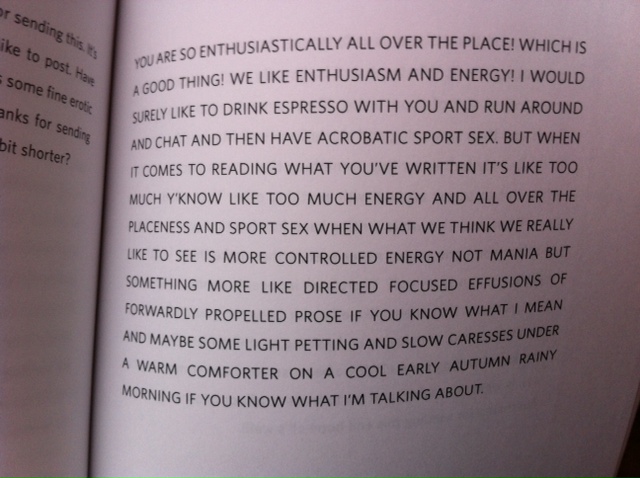
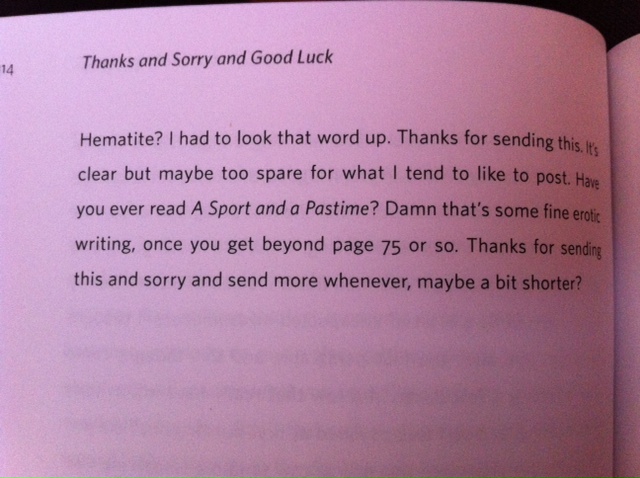
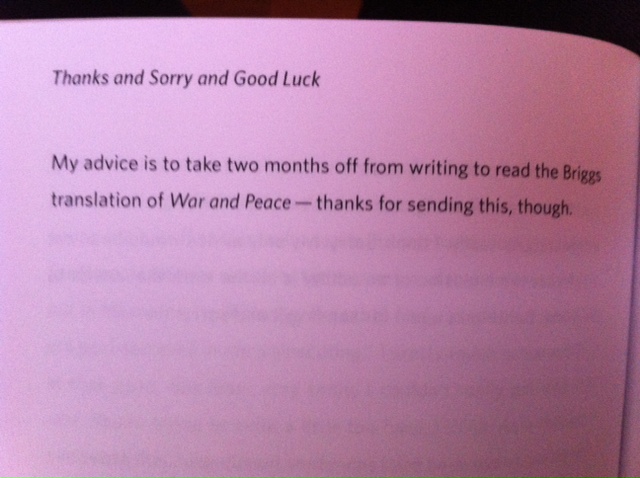
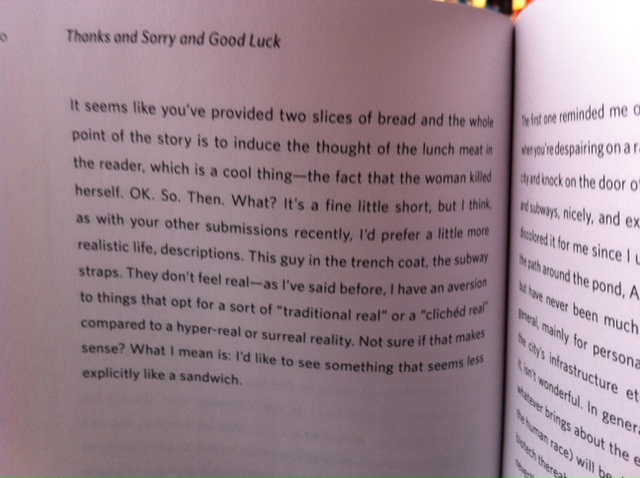
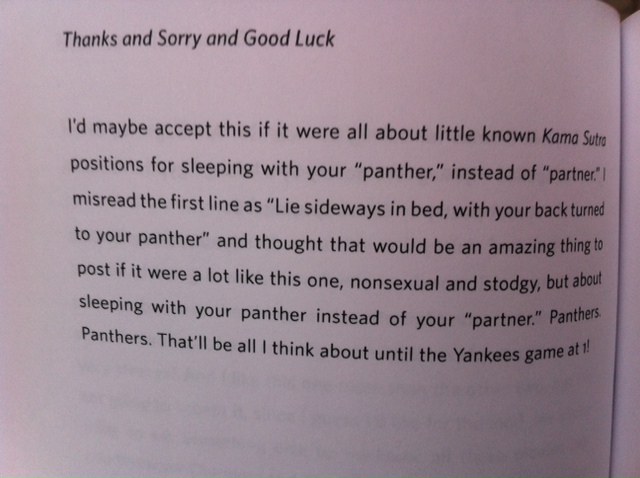
Four nice blurbs
Somewhere on the brutal truth continuum between Bill Hicks and Mussolini,
Lee Klein's rejection letters are mini-masterpieces of literary criticism
disguised as no-thank-yous from Writer's Hell. And yet, in each, a little
lesson; a steadfast faith that says "I took the time to read what you created
and this is exactly what I thought." They should be passing these things
out under the pillows at MFA camp; we'd all be better off.
-- Blake Butler, author of There Is No Year and Sky
Saw
To “decide” is to “cut,” and Lee Klein in the highly honed collection of
rejections, Thanks and Sorry and Good Luck, wields a drawer full
of gleaming cutlery, edgy edged instruments of decision. Surely, he holds
his pen like a surgeon holds the scalpel. These serrated graphs of glee
and screed are incisive incisions—katana, rattled sabers, sharp-tongued
stilettos of the split-lipped kiss-off.
-- Michael Martone, Author of Michael Martone and Four
for a Quarter
Sometimes writers who succeed against the odds brag about the number of
rejections they've accumulated. A rejection from Eyeshot's Lee Klein is
a whole different badge of honor. Like a letter from a serial killer on
death row, your Tea Party inlaws, or the Pope, they're suitable for framing
and brilliantly repugnant. I kind of want to send him a really shitty story
just so I can get one of these in return.
-- Ryan Boudinot, author of Blueprints of the Afterlife
Lee Klein made me cry. He was the only editor ever to make me. This was
back in 2002. I wish I still had the email. I remember it going something
like, “whenever you have the instinct to write a line like that, delete
it immediately, without prejudice.” I hated him for a while. I pictured
him looking like the guy in that 90’s movie Heavy (the one with Liv Tyler),
except housebound and with no redeemable qualities. Then, somewhere around
2004, I met him “IRL” and he was soft-spoken and sweet. It was harder to
hate him after that. Reading all of these rejection letters here in this
book made me finally fall a little in love with him, I think. I think if
I had had access to (and disassociation from) these letters then, I might
have fallen in love with him then. This is the funniest book I have
read in a long time. It is also the smartest. I feel confused now, like
I’m unsure whether to love or hate Lee Klein. But both of us are married
now so it doesn’t really matter.
-- Elizabeth Ellen, author of Fast Machine
ORDER
THE BOOK, IF YOU'D LIKE, VIA THIS LINK
|